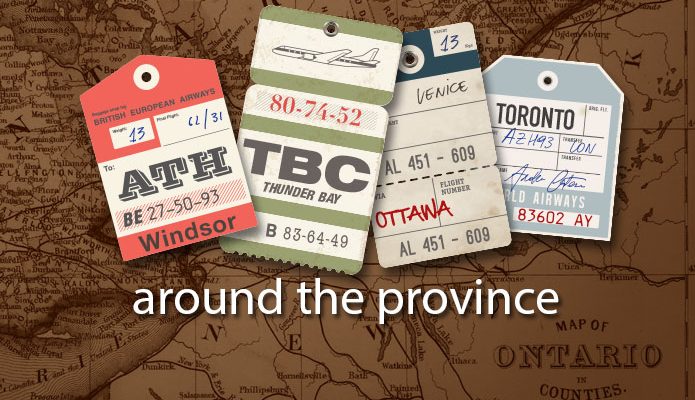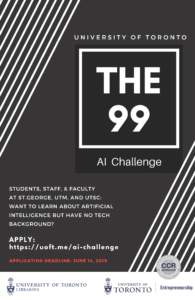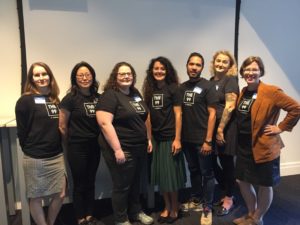
The 99 AI Challenge – open learning at the University of Toronto
By Mike Serafin

Though many people aren’t aware of it, they are using AI every day. From Netflix recommendations to routing with Google Maps or Waze, we interact with AI all the time. But how much do we really know about how it works? The 99 AI Challenge was a program at the University of Toronto that began in the spring of 2019 to educate the community at the University of Toronto on various aspects of the technology. A group of librarians formed a learning project to help the university community learn about the fundamentals of artificial intelligence (AI) and its impact on other disciplines such as ethics, arts, and healthcare. The team included librarians from all three of the University of Toronto campuses: Lise Doucette, Christina Kim, Paulina Rousseau, Michelle Spence, Carey Toane, and me. We designed the pilot program to reach those who did not have a technical background and had not had previous instruction on AI.
In the spring of 2019, we started to promote the program, which had an enrolment limit of 99 people, to the University of Toronto community. The level of interest was very high as there were approximately 550 applications from students, staff, faculty, and community members across many different disciplines. We used a rubric to select participants from a wide variety of disciplines and to ensure that the group was diverse in terms of race, gender, and age.
The program had two phases, both of which participants had to complete to be eligible for the program’s graduation. . The first phase took place in the summer of 2019 and included a meet and greet to kick off the program and completion of an Open Education Resource, The Elements of AI . The second phase took place from September 2019 to March 2020 and consisted of six in-person talks by experts in the AI field, and covering the following topics: AI in immigration, the ethics of AI, AI and healthcare, AI and art and performance, machine learning bias, and AI startups by women founders. We structured the six sessions to be conducive to discussion, with the experts giving a brief 15-25-minute talk on the topic followed by a moderated discussion, using a think-pair-share model. Participants needed to attend four of the six in-person talks.

We administered two online surveys to program participants, one after each of the two phases. The survey at the end of the first phase asked what topics the participants wanted to see covered in the second phase, and we used their feedback when curating the talks. Data collected included reflective content like learning assessment, changes in perspective, and program satisfaction. Both surveys also collected data on demographic information. Eighty-one people completed the first survey and 53 answered the second survey.
Surveys indicated that the program was a success. In the first survey, respondents indicated that they felt more comfortable engaging in meaningful discussions about AI with others. We also observed that many participants could incorporate some parts of AI into their teaching or research. In the second survey, 90% of respondents felt that participating in the challenge increased their knowledge and understanding of AI. There was overwhelmingly positive feedback from those who attended the in-person talks, where participants found discussing AI with people from such a wide variety of areas of study and expertise refreshing and worthwhile.
We did receive some constructive criticism from the surveys as well. Some participants wanted longer speaker presentations so that they could more thoroughly discuss topics that they had not thought about before. Some participants indicated that they would be interested in a more advanced course or a “Part 2” of the challenge.
While AI has the potential to affect all of us in our everyday lives, learning about aspects of AI is not always easily accessible. The library is well positioned to lead and continue its tradition of offering open and equitable access to this type of programming.
—
Mike Serafin is a Library Technologies and Liaison Librarian at the University of Toronto Mississauga. He can be reached at mike.serafin [at] utoronto.ca.


